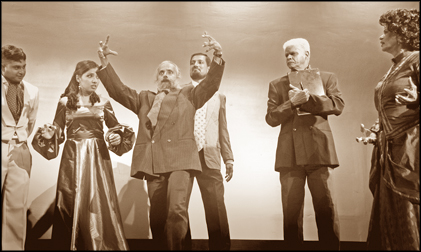Namel Weeramuni - Dramatist
 Namel Weeramuni has gifted much to the contemporary theatre scene in
Sri Lanka. No one in the know, will ever gainsay this. Namel Weeramuni has gifted much to the contemporary theatre scene in
Sri Lanka. No one in the know, will ever gainsay this.
All aspects of play production have received undiminished enrichment
from his sustained theatrical effort. Above all, he brought to the local
theatre, a steady and unswerving commitment and an unfluctuating
loyalty.
With all that, Namal Weeramuni, still remains under-admired,
under-appreciated, and under-recognised. He is not entirely un-sung
though, because occasionally some significant voices are raised in due
praise of his achievement. My friends Gunadasa Amarasekera and Wimal
Dissanayaka (to name some) make generous pronouncements, at times,
underlining Namal's crucial role in the fields of art and culture in Sri
Lanka.
 |
|
Namel Weeramuni |
Of the younger group of communicators, Ranga Chandrarathne and
Indeewara Thilakarathne - among a few others - never overlook the need
to highlight Namal Weeramuni's outstanding performances. In the
background provided by these instances, I should correct myself and say,
that, Namel is not un-sung, but only under-sung. Currently, Namel
Weeramuni has set theatre lovers astir, with his latest production. For
nearly 40 years, Namel Weeramuni has been keenly fixated upon Jean Marie
Lucien Anouilh - one may even say, to the point of obsession. This state
of mind has been brought on, perhaps, by Namel's earnest and anxious
quest for perfection. French dramatist Anouilh (1910-1987) may have
inspired Namel, by his conscientious craftsmanship, he inherited from
his tailor-father. Anouilh transferred this professional perfectionism,
to the theatre.
Namel Weeramuni introduced his Sinhala version of Anouilh's "Mademoselle
Colombe" for the first time to the Sinhala theatre under the title "Nattukkari".
This was way back in 1970.
Nattukkari has gone through a whole series of incarnations since
then, and has now approached a near faultless perfection. Anouilh was
happy with an impersonal, colourless label - for his play But, Namel
gave it a name, that has several layers of meaning.
On the surface, it means the "Woman Dancer". At a deeper level, it
could mean "Show-off", "Exhibitionist" or even "coquette".
Jean Anouilh, the playwright Namel Weeramuni has opted to focus upon,
is a classic performer in World Theatre, recognised as a Philosopher -
Dramatist. His Characters generally inhabit a world, where "Idealism" is
fragile, vulnerable and is eminently corruptible. There is hardly any
man or woman, who is not touched by a sense of the romantic. but,
"Idealism" in most instances, comes to grief when assaulted by harsh
reality.
The indifference to Idealism, can at times breed a harsh cynicism.
Anouilh's characters, can be seem developing a form of stylized
cynicism, which they tend to consider to be the most sophisticated
attitude towards life.
Namel Weeramuni's "Nattukkari", pivots round the character of Miss
Colombe. When the audience makes its acquaintance with her in the first
instance. She is coy, unspoilt and is dominated by moral values.
Strangely enough, it is mademoselle Colombo, who changes most, as the
play progresses.
The initial scene introduces her as a young wife, who is totally
committed to the idea of clinging on to her husband, whatever
vicissitudes of life may assail him.
 |
|
A scene from Nattukkari |
Colombe's young husband Julien, is an unabashed idealist. He believes
explicitly in pare love. He is not at all interested in compromising his
ideals.
His mother Madam Alexandra, possesses an over powering personality.
Domineering all those around her as her way of life. She needs, all
those around her to move about her, like planets orbiting their sun. In
the role of Madam Alexandra Actress Malini Weeramuni's portrayal is
hympotic. Many a young actress very well appreciated what dialogue
delivery is, if they study her performance.
Namel Weeramuni's "Nattukkari", is complete drama. Each item and even
the least segment, reinforces the performance.
The verbal inflections, the costuming, the make-up, the mannerisms,
and the measured and well-timed responses of the players to each other,
have all been assiduously choreographed.
What really matters, is the manner in which the unrealized absorption
of the audience, in what is going on, on stage, is ensured. This is the
remarkable outcome of relentless, professional training. The mastery
over the significant detail would not have been possible at all, had it
not been for the disciplined control over the totality of the
production, by the director.
As we approach close to the end of the play, we are overwhelmed by
the transformation of Colombe.
She is very much a part of the coterie of cynical realists, who do
not see any reason whatsoever to change.
The Idealist Julian (portrayed with an appropriate projection of
innocence, mixed with bewilderment) discovers that he is helplessly
isolated in a world of matter-of-fact realists. His entrenched belief in
fine love, is punctured sullenly by his mother - in common human sense,
the fountain of all love.
Colombe, who professed such eternal love to Julien, new looks on him
as an obsolete fossil, that has no functional value in her scheme of
things.
Julian still clings on to the stage on which he met Colombe for the
first time. His idealistic love, does not allow him to be realistic
about the changes that have made Colombe spurn his world.
Surete (Daya Tennakoon) recounts anecdotally, the fickleness of
women, quoting the infidelity of his own wife. But, Julien's attitude
never changes.
The mother offers her money, the perpetual symbol of the practical
world of realistic materialism. Namel Weeramuni, has lavished material,
money, and above all his creative resources, upon this productions. The
overall result is an eminently entertaining piece of theatre.
Namel has given an object lesson on play-production and the
meticulous medication to the stage.
In a contemporary context, where play production is generally a messy
affair, Namel sets up an ideal in disciplined presentation of drama.Once
loyalty to the original work, is a factor, that is foremost, when one
adopts material for the local theatre unless the adaptation springs from
a deep empathy for the vision and the sustaining worth-view of the
original playwright, the resulting adaptation will become only a surface
presence.
Anonith categorized his plays into several classes. Some were
characterized as Pieces Noires (black pieces).
To him certain others were 'rosy' or pink (pieces Roses). Though
there is no knowing how he characterized Mademoiselle Colombo, I tend to
believe he would rate it pink and slightly black.
It possesses an aristocratic inner being, though its leading
character finds his Idealism, totally down-trodden.
Namel Weeramuni leads a life of drama. The play is one thing for him.
He has chosen give everything he has to the cause of theatre.
In sum, he is one of those incorrigible 'Idealists' of Jean Anonilh's.
|

